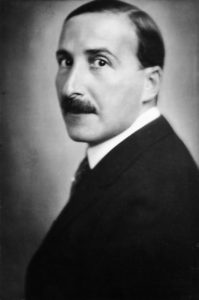Stefan Zweig (1881-1942) was a Jewish author from Austria who, having emigrated in 1934 due to the rise of Hitler in Germany, was living in London as a refugee. In his day, he was one of the most popular and translated writers in Europe.
His 1939 novel, “Beware of Pity” (NYRB Classics, $18.95), tells the story of a twisted psychological “romance” grounded in a deeply disordered concept of compassion. It’s been called frightening, gripping, intoxicating, and Zweig’s single greatest work.
Anyone who has ever been the victim — from either end — of unrequited love will squirm, it must be said deliciously, throughout.
The setting is the Austro-Hungarian empire before the eruption of the First World War. The book is told in hindsight by Anton Hofmiller, a famously decorated soldier in his maturity (he denigrates his military accomplishments, refusing to think of himself as a hero), but at the time the tale begins with a young cavalry officer.
Through a chance meeting at a café with friends, he’s introduced to a local millionaire, Kekesfalva. Believing him to be a nobleman (in fact Kekesfalva made his money through shrewd business dealings), Hofmiller approaches the family castle with awe and trepidation. His first evening there, he’s introduced among others to Edith, Kekesfalva’s crippled daughter.
Edith, 18, has lost the use of her legs in a riding accident and is coddled, pampered, indulged, and lied to within an inch of her life by all those who surround her.
No one has bothered to tell Hofmiller that Edith can’t walk and, having come late to the dinner party, he’s only seen her sitting down. After coffee, cigars, and liqueurs, the band strikes up and Hofmiller hugely enjoys himself dancing with the pretty ladies.
Then, realizing that courtesy demands he must also dance with the host’s daughter, he approaches Edith and asks.
A gracious, mature young person might have responded: “You’re so kind, but you see, I’m unable to dance. Do pull up a chair, though — I want to know all about you!”
Just about everyone in the novel, though, has emotions that are absurdly delicate and overheated.
So instead, with insane melodrama Edith starts, stares, attempts to rise unaided from her seat, totters forward, and with a tremendous clatter, falls splat on the floor. Hofmiller very understandably flees, but in the aftermath convinces himself the gaffe was his, reproaches himself for cowardliness, returns to the castle, is slowly made to feel that Edith lives for him alone, and thus the tragedy unfolds.

Zweig knows there are two kinds of pity: one weak-minded and sentimental, one unsentimental but creative.
Edith’s treating physician, Dr. Condor, supposedly exemplifies the second kind. Many years before he had accidentally blinded a patient — then married her. He’s not in love and the two have virtually nothing in common. Shut away in their home, untidy, desperately lonely, and possessed of a doglike devotion, she lives for his brief presence, his smallest need. He, in turn, unfailingly if absentmindedly kind, believes he is sacrificing his life for a worthy cause.
But is that compassion?
Condor, too, lies to Edith. There may be a cure, he tells her month after month (knowing there isn’t): let’s wait and see. Later he lays a massive guilt trip on Hofmiller, informing him that if he fails to continue his “friendship” with Edith, he will have in essence committed a murder.
On and on the story creeps, with one more ridiculous episode of crossed communications. Hofmiller keeps thinking Edith will read between the lines; Edith keeps pathologically clinging, spinning the smallest crumb of affection into a declaration of love.
One day, having been consigned to bed by yet another misunderstanding-induced hysteric collapse, she begs Hofmiller to come into her chamber before leaving. In a burst of pity, he leans down to kiss her forehead, whereupon she jerks herself up, grabs his head between her hands, and kisses him avidly, greedily, on the mouth.
Hofmiller is horrified, repulsed, shaken to the core. Soon after, he agrees to marry her.
Check out the 1946 film starring Lilli Palmer, also called “Beware of Pity,” if you long (as I did) to see all this hothouse activity in action.
The whole novel you want to shake Edith, her father, Dr. Condor, and Hofmiller, and say, like Christ to the paralytic at the pool of Bethsaida, “Wake up! Do you want to be healed? Pick up your mat and walk!” (See John 5:1–9).
Walk, even if you can’t physically walk, into a life of honesty, integrity, purpose, and meaning. Accept your limitations and quit with the emotional blackmail. From the receiving end, quit letting yourself be manipulated and guilt-tripped. Risk being thought not compassionate.
That is authentic, creative love, not the sickly lies and faux martyrdom that so often pass for love.
The historical backdrop to the novel was the slow build of Nazism. In his introduction to the 2013 Pushkin Press edition, journalist Nicholas Lezard notes: “One of the earliest writers to note what Freud was doing, Zweig took on early the lesson that directly dealing with terrible things is not necessarily the way the mind works. His stories are full of characters poisoned by things left unsaid, or situations misread. We tell ourselves stories about what is going on, but sometimes they are the wrong stories.”
Zweig moved briefly to New York City, then to Brazil. There he and his wife Lotte committed suicide together in February 1942, overdosing on barbiturates.

